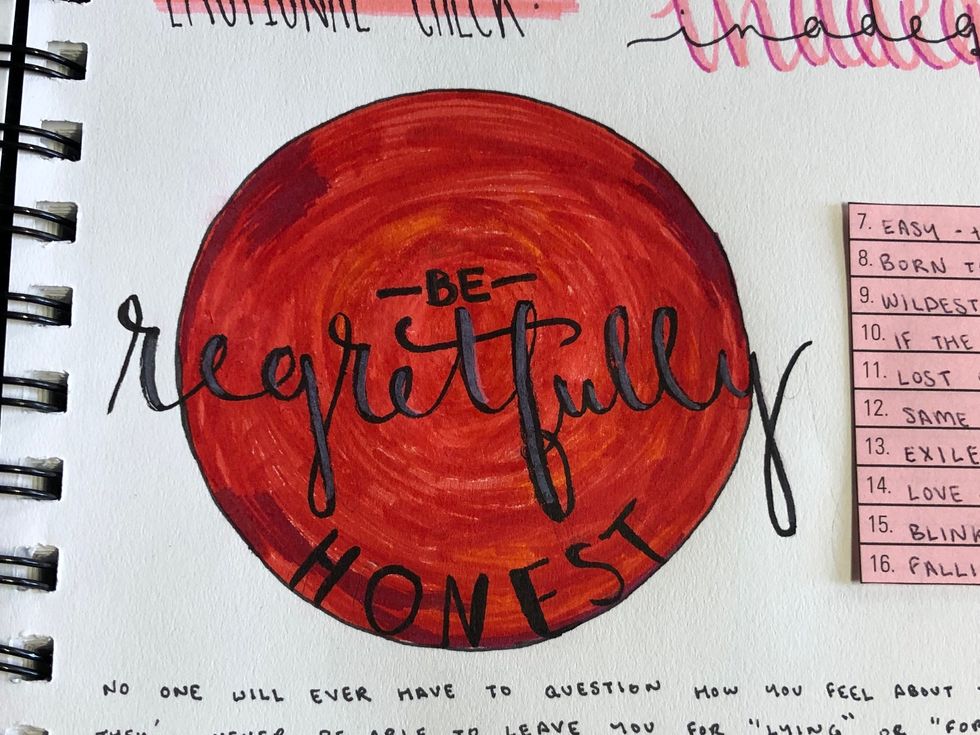In 7th grade, I sat in my high school chapel ceremony, and they prepared an entire sermon on honesty. It's not that far-fetched considering how important telling the truth is regarding the Christian faith. There were tons of Bible verses connected to "thou shalt not tell a lie," one of the 10 commandments, but I remember this lesson well.
To open the sermon, the speaker began with Dr. Brad Blanton's famous study about "radical honesty." Blanton proposed that we should live our entire lives without a single lie, meaning whatever comes to your mind, you have to say it out loud. This is a very severe and raw commitment to hold back absolutely nothing. In an Esquire article, A.J. Jacobs details the idea of radical honesty, and he illustrates the concept well by saying,
"Confess to your boss your secret plans to start your own company. If you're having fantasies about your wife's sister, Blanton says to tell your wife and tell her sister. It's the only path to authentic relationships. It's the only way to smash through modernity's soul-deadening alienation. Oversharing? No such thing."
You cannot keep anything to yourself; you have to fully commit to everyone knowing your exact thoughts. This concept and way of living has been highly discussed and even received a popular film adaptation, Liar Liar, where Fletcher Reede cannot lie for 24 hours.
Obviously, I don't think that you can release every single thought - I think that would destroy relationships more than it would help them. Since this lesson, though, I have always valued honesty, and I try my hardest not to keep any secrets. I am upfront. I am blunt. People typically do not have to question how I feel about things, and I genuinely think it's a good way to live.
As I've grown into my own individual, I've realized that maybe I shouldn't be radically honest, but perhaps, regretfully. The word "regretful" typically has a negative connotation but I want it to be redefined for the sake of this campaign. I picked this word because sometimes people won't like what you have to say, or maybe you said too much, but at least no one has to question your stance. I think that a lot of relationships suffer from blurred lines or miscommunication. It's not necessarily that people lie to one another (although that does happen), but rather, people are not fully committed to the relationship they're cultivating. That's a waste of my time.
In his song "Honest," Andrew Taggart starts the audio with himself talking, and he says, "Be the first to act yourself, I always think," and I keep that quote with me daily. As I develop a friendship, as I fall in love, as I build professional connections, I want to be 100% myself. If I can't do that, then I'm going to personally struggle with the relationship because then I have to worry about how the receiving end interprets my words, actions, feelings, and so forth. To act myself is to be clear about all areas of my intentions with an individual.
I've adopted this campaign to "Be Regretfully Honest" because I don't see the purpose of mixed signals. I don't see the purpose in hiding from people. Being open and vulnerable is one of the best ways to build a relationship in my opinion, but that isn't always easy. No one is jumping the gun to admit to insecurities or emotional baggage, but to truly connect, there has to be an authenticity.
be regretfully honest. no one will ever have to question how you feel. no one will ever be able to leave you for “lying” or “forgetting.”— j. powell (@j. powell) 1596643127.0
For me personally, I fear that as people get to know me, it will overwhelm them so much that they leave because they might think I'm too much to handle; I've discovered the best way to get through that fear is to let people know that it is something I worry about. I love this life principle so much because it encourages you to be vocal. It makes it easier to communicate when there are issues. It removes an awkwardness to have and talk through problems.
If I'm going to get to know you, I don't want to learn about you - I want to learn you. That can only happen when both parties attempt to be regretfully honest.

















